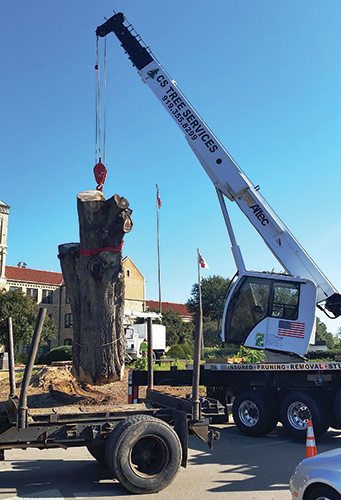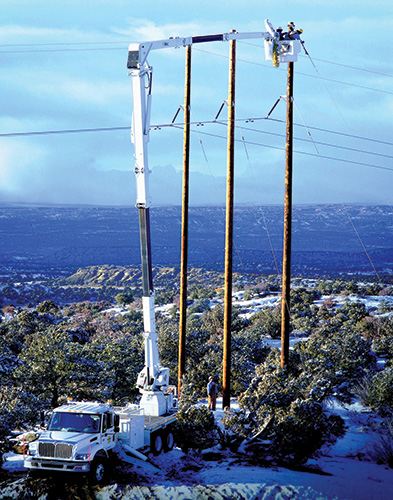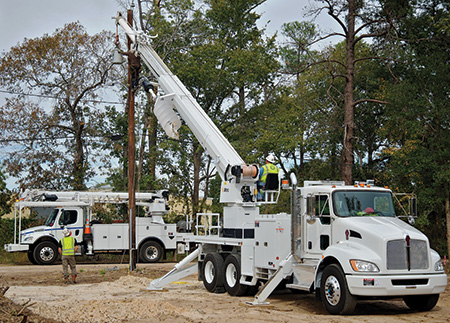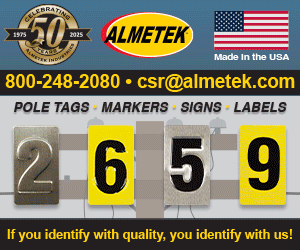Deciding whether to buy a new or used bucket truck comes down to two things: what you need and what you can pay. Finding a balance between needs and costs may seem as much art as science, but you don't need to compromise either in the process; it's about finding the best fit for you.
Before You Start the Search
Budget and needs go hand-in-hand. Alex Senf, Altec Senior Account Manager with a well known equipment supplier walks his customers through a NEADS analysis before ever considering a final decision. This simple analysis, originally developed by Tom Hopkins, is critical to establishing a good starting point for an equipment search.
Now. What do you have now in terms of make, model, function, body type, etc.? If the answer to this is nothing, that's okay. Focus on what you want a piece of equipment to do for you.
Senf recommends starting out with the following spec details: platform size (one man or two); material handling or non-material handling; insulating or non-insulating; line body or flatbed; and under CDL or over CDL chassis.
Also, consulting with someone with a similar job application to gain experience with features found on different pieces of equipment can be beneficial.
Enjoy. What do you enjoy about that piece of equipment? Dedicate some time to discovering the features that make your specific job easier and those you can do without. Sometimes eliminating something simple like an extra bin or ladder compartment can equate to big savings.
"Often it's very easy to knock off several thousand dollars on the price of a truck if the buyer goes through a spec sheet, line by line, to decide what's needed and what isn't," said Senf.

Alter. What would you change? Consider the limitations of what you currently have. Do you need to lift personnel higher, prevent rusting, improve payload, eliminate engine idling?
Decisions. How are decisions made? This doesn't just include the process, but also who is involved in making the decisions. Including the right people in the decision making process ensures that costs/ budget and needs/requirements for use stay balanced throughout the decision process.
Solutions. Listening well and understanding needs throughout the process leads to the best solutions for the seller and the buyer.
Purchasing New Equipment
No two purchases, or needs, are exactly the same. While every request is different, some take you to the realm of customization - a specific ladder rack or tool box, for example - that may only be available from a new equipment purchase.
Ed Hunter, President of Horizon Lighting in California, has purchased a variety of new and used trucks for his lighting maintenance and construction business.
"Many times, it's a tough decision whether to buy new or used," said Hunter. "I've had great experience with both new and used purchases from Altec. Before making an investment, it's important to have a good understanding of what you're going to do with the truck including how high you need it to go, the unique locations of your job sites and the tool storage you need.
Like Senf suggests, testing other equipment is a great way to learn the features that make your job easier. When it comes to a piece of equipment that is being tested or considered, the features may be the most important aspect to analyze.
"A lot of times, a customer will want a truck exactly like one they've seen used by someone else," said Senf. "I always ask them why. Without going over each spec, line by line, the customer could end up paying thousands of dollars more than what they really need."
Before and After
Figuring out what you need your equipment to do for you is the first step. Then what? It's time to think about the future and how you will use and care for equipment.
Service and repair are part of owning and maintaining any piece of equipment. Working with an equipment provider that offers convenient access to mobile technicians and service centers provides peace of mind.
"With any equipment purchase, make sure the company you're doing business with has the ability to provide service and support after the sale," said Senf.
For some owners, the costs incurred from downtime sometimes associated with older pieces of equipment are enough to invest in a newer unit with less mileage.
"When I have a truck go down, that kills my business," continued Hunter. "Having a reliable piece of equipment doesn't always mean new, but the new trucks we have purchased have had a much better track record for repair costs over a long period of time than the used vehicles."
Purchasing Used Equipment
Since used equipment typically costs about half the price of new, it's often a cost-effective choice for some buyers. With the proper planning, purchasing used equipment can mean reduced acquisition costs and a dependable, certified used equipment investment.

Casey Tolley, Altec Account Manager, notes that advertised used equipment prices don't vary too greatly from dealer to dealer. What can vary is the diligence associated with inspecting and testing used equipment. "Make sure your equipment has undergone an annual service inspection including dielectric testing on the boom, as well as annual testing on the unit and chassis," said Tolley.
With all equipment, routine maintenance and service are an inevitable part of ownership. Working with a dealer that has inspected your equipment and can help provide maintenance can make the wear and tear on your equipment, and you, a lot less stressful.
"I choose Altec because I like dealing directly with the manufacturer of my equipment," said Hunter. "They build the equipment, so they are the best at repairing and maintaining it. I have a mobile service tech in my area, so when I run into a problem, I know who to call for both my used and new equipment."
An equipment auction is a great place to find used equipment at a low price, especially if the equipment is needed quickly. Contractors often have jobs requiring immediate needs for a piece of equipment or multiple pieces of equipment for a short period of time. Once the job is finished, purchasers often have the option of re-selling their trucks again at auction.
"If you are a new business owner with a limited budget and you want to make sure you're making the right decision, consider working with a used equipment dealer," said Tolley. "If you're more experienced with equipment and know how to choose what's right for you, an auction might have what you're looking for."
Auctions usually allow buyers to come the day before to touch, see, feel, and operate the trucks before they place their bids. Bring the correct people to help make the decision including operators and a mechanic, if you have one. Once a piece of equipment is purchased at auction, it's yours, so come prepared with what you want and include the right people in your selection.
The used equipment market is extensive and changes every day, so finding what you need shouldn't be a problem, but building in a timeline to your search helps.

"If you want four tool bins, but you can only find a truck with three, keep looking," said Tolley. "A good dealer will be able to find it for you. If you have time on your side, you can afford to be picky with your truck."
The more information you know about the truck including its usage, engine hours, and maintenance records, the more likely you are to make a sound investment. Trucks once belonging to an organization requiring regular upkeep and maintenance, like electric utilities and municipalities, usually make trustworthy purchases.
"We've had great experience with buying used trucks from municipalities," said Hunter. "They perform standard service checks and are generally maintained very well."
Bottom Line
Whether you decide to go the new or used equipment route, what's most important is to get what you need. If you purchase a low mileage, low PTO truck at an auction, but it doesn't meet your needs, it doesn't matter what kind of deal you got on it. Establish a budget, know your needs, include the right people in your decision, find a trusted equipment partner and be patient, if you can.
"I never try to encourage one or the other - new or used," said Senf. "Understanding a need and finding the best solution is always the best way to serve."
About the Author
 Margaret Ann Walker is a member of the Marketing Communications Team at Altec Inc. based in Birmingham, Ala. Margaret Ann writes content for altec.com and contributes editorial for trade publications representing the markets Altec serves. Altec is a leading equipment and service provider for the electric utility, telecommunications, contractor, lights and signs, and tree care markets. The company provides products and services in more than 100 countries throughout the world.
Margaret Ann Walker is a member of the Marketing Communications Team at Altec Inc. based in Birmingham, Ala. Margaret Ann writes content for altec.com and contributes editorial for trade publications representing the markets Altec serves. Altec is a leading equipment and service provider for the electric utility, telecommunications, contractor, lights and signs, and tree care markets. The company provides products and services in more than 100 countries throughout the world.







